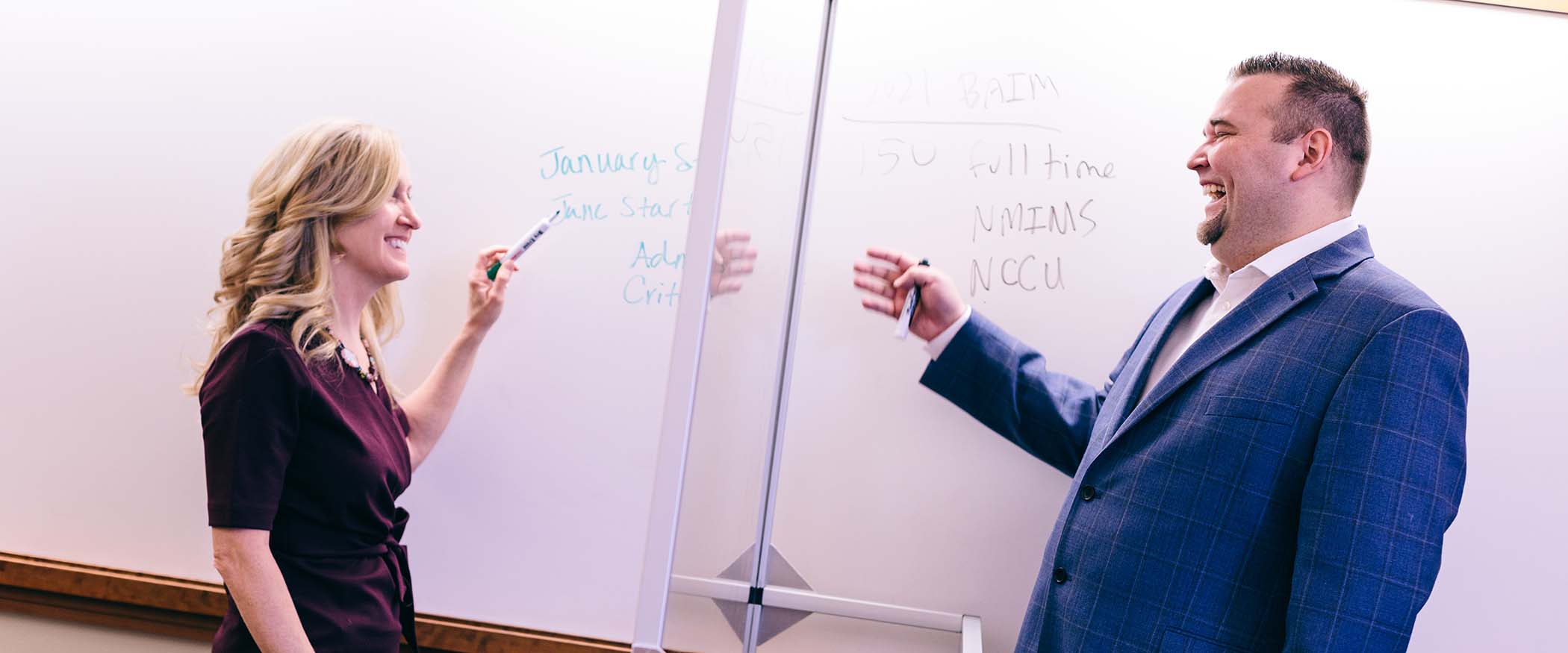
A successful institution of higher learning lives up to a critical mandate: to constantly evolve its majors to keep up with industry needs and best prepare its graduates to lead the charge in fulfilling those needs.
Purdue University has been recognized in many ways for its innovative spirit, and its business school has embodied that spirit by revamping its undergraduate offerings. The School of Business has launched three new BS programs in the past two years: The Integrated Business and Engineering (IBE) program began in fall 2021, and the Business Analytics and Information Management and Supply Chain and Operations Management programs will enroll their first students in fall 2022.
“Our approach to innovative curriculum starts with our faculty,” says David Hummels, the Dr. Samuel R. Allen Dean of Purdue’s School of Business.
Our undergraduate students are taught by faculty who are not only leading scholars in their fields, they also have broad disciplinary backgrounds. Indeed, not every faculty member has a PhD in management -- and may come to the classroom from across Purdue’s campus. The school benefits from having front-of-the-class experts in psychology, communication, engineering, data science and more.

“That gives us a different lens on the kinds of skill sets that students need, the kind of methodologies they need to perfect, the kinds of problems that businesses need to tackle,” Hummels says.
Amy David, a clinical professor of management, researches the impact of the arts in business education. She has found that exposure to live theater can influence business school students to make more ethical business decisions.
David was named a Poets & Quants Top 50 Undergraduate Business Professor in 2020. The Poets & Quants coverage highlighted David’s “fascinating and unique research” and noted she “demonstrates leadership, kindness, innovation and support in her classroom and goes beyond what a normal professor would for their students.”
Highlighting its commitment to fostering curricular innovation, the Daniels School of Business created a committee of faculty and graduating seniors to oversee the Alumni Teaching Excellence awards.
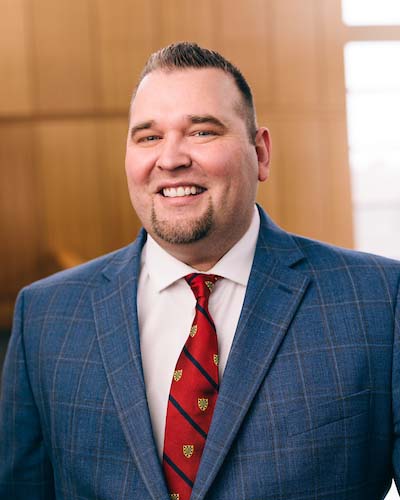
Quantitative Methods area faculty member Matthew Lanham was recognized for Excellence in Course Innovation for his work in Management 473, Data Mining, and Management 474, Predictive Analytics. Both courses are project-based and focused on teamwork. Student teams from his courses are required to present a high-quality poster of their class projects for the Purdue Undergraduate Research Expo or other research symposium.
The second award, for Excellence in Course Delivery, went to Cara Putman for her work in Management 254, Legal Foundations of Business. A faculty judge commented on the innovative way that her learning objectives were linked to activities designed to allow students to apply their knowledge to real-life situations.
Putman is a clinical assistant professor and director of the Brock-Wilson Center for Women in Business. In addition to her many undergraduate and graduate courses in law, business ethics, and corporate governance, she has taught Management 254, a core business law course that nearly all business undergraduates take, for more than 15 years.
“When I think about innovative teaching, I think about constant experimentation -- or in a business term, continuous improvement,” Putman says. “How can I take a class that I may have been teaching since 2006 and make it more relevant for students? How do I make it more engaging, more interactive, more applicable?”
She’s had to consistently ask herself these questions, as many undergrads coming into the Legal Foundations of Business course don’t initially see the value of it.
“They're like, ‘why do I have to take this class?’” she says. “So, I've made it my personal challenge from the beginning to think about how I could take something that feels really disconnected and make it more relevant.”
"They're like: 'why do I have to take this class?' I've made it my personal challenge from the beginning to think about how I could take something that feels really disconnected and make it more relevant."
Cara Putman, winner of 2021 KATE award for Excellence in Course Delivery
She focuses on teaching her students how to apply new knowledge both today and in the future. In a project on the lifecycle of a business she started with some basics – deciphering the “alphabet soup” that is Washington, D.C., namely the SEC, FBI, EPA and other agencies that business answers to. She ended the project aft – well, the end.
“We literally went through that lifecycle approach and ended with bankruptcy, because that's the death of a company,” Putman says. “It’s been so much fun to watch students’ light bulbs go off – ‘now I understand why insurance matters and why we’re talking about it in a business class.’”
Putman is actively mentoring new faculty. She’s part of a committee that recently drilled deep to define teaching excellence at the Daniels School of Business. A key characteristic of excellent teaching is not falling into the “this is the way I’ve always taught, and this is the only way I'm going to teach” mindset, she says.
“Let’s instead operate in a continuous improvement type of environment,” Putman says.

You can get very comfortable with your degree offerings, and trying to do something different takes a lot of energy, says Dean David Hummels.
“It takes a lot of buy-in from your faculty. But we feel we’re at a really interesting turning point in the history of not only the Daniels School and Purdue, but higher education as a whole, in which very slow-moving approaches to innovation in curriculum are not going to be adequate,” he says.
“The speed at which business is changing, the speed at which faculty expertise is changing, all of that points to the need for a curriculum that adjusts, that adapts, that responds to market needs on a much faster time scale than before.”
When thinking about the Daniels School's degree offerings, Hummels is mindful of three key populations:
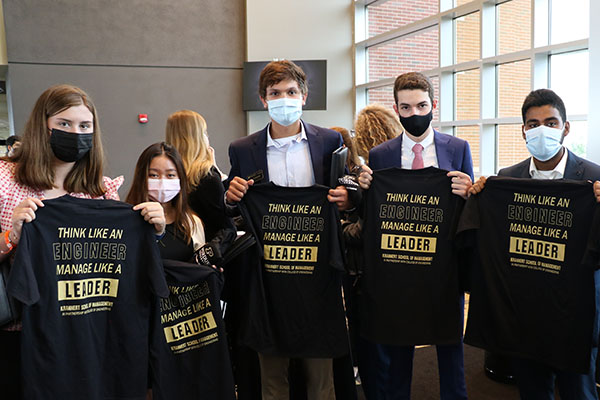
Prospective students: What are they looking for? What skill sets and capabilities do they wish to develop?

Employers: What capabilities are they looking for from our students?
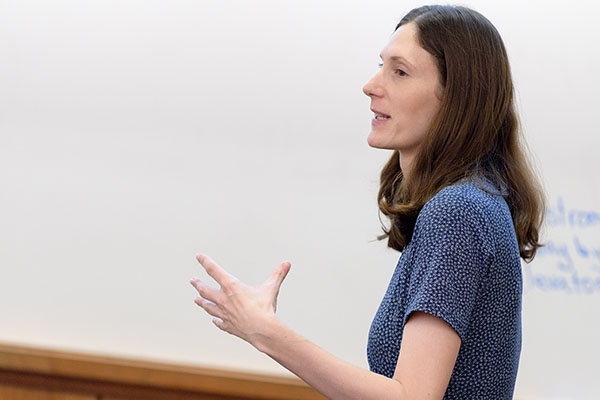
Faculty: In what areas do we have truly outstanding faculty?
“Our faculty in supply chain and operations management are among the best in the entire world, with some of the leading scholars running one of the best master’s programs anywhere,” Hummels says of Daniels School's’s MS in Global Supply Chain Management. “There’s an enormous demand for folks who can solve supply chain problems, and students realize that there are very interesting problems to solve.”
So, Daniels School created the Supply Chain and Operations Management degree program to serve a combination of needs; utilize faculty who are truly outstanding in this area; and overhaul the school’s Supply Chain, Information and Analytics program.
The new undergraduate Business Analytics and Information Management program parallels the Daniels School’s top-ranked BAIM master’s program. Applications for the first class are outsize, and Hummels predicts the BAIM BS will become one of the Daniels School’s largest and most celebrated undergraduate majors.
The just-launched Integrated Business and Engineering (IBE) BS degree is a joint program with Purdue’s renowned College of Engineering that prepares graduates to work at the intersection of engineering and business.
To answer the growing demand for talent within the rapidly evolving real estate industry, the Daniels School will also offer two new minors starting in fall 2022 through our new Dean V. White Real Estate Finance Program. These minors will prepare students to plan, develop and manage successful commercial real estate projects. Daniels School majors can minor in Real Estate Finance, while non-Daniels School of Business majors can minor in Real Estate.
Matthew Lynall says the drive to innovate is in the university’s genes.
“It’s just the way we operate, and I think it’s why faculty and students come to Purdue,” says the director of Purdue’s Burton D. Morgan Center for Entrepreneurship.
Lynall cites the university’s 10-plus years of frozen undergraduate tuition; Purdue’s response to the COVID-19 pandemic; and the university’s approach to problem-solving.
“From the day he came on board, (Purdue president) Mitch Daniels made it very clear that our responsibility as a research organization and as a land grant university was to ensure that the research we do provides a benefit to society and the economy,” Lynall says.
As director of the center for entrepreneurship, a clinical professor at the Daniels School who oversees IBE experiential learning projects, and director of Purdue’s National Science Foundation Innovation Corps Site, Lynall has a 360-degree view of the university’s innovation successes. He points to robust entrepreneurial and commercialization efforts as evidence of ongoing innovation.

“We have a really well-oiled pipeline for enabling students and faculty to take their ideas and their technology and translate them into valuable products and services,” he says. “We are often visited by our peers because they want to see what we do and why we do it so well.”
Purdue is ranked third in the country in number of companies formed based on university-based IP and is in the top 20 in terms of patents, he notes.
The university puts resources into innovation. The Burton D. Morgan Business Model Competition, one of the country’s longest-running business model competitions, has a prize pool in excess of $100,000 thanks to an endowment managed by the Daniels School of Business. Many of the winners of that competition have gone on to form companies and many of those winners were our students, Lynall says.
Recently, undergraduate economics and finance major Christopher Jing, Class of 2021, co-founded AeonCharge, which Lynall calls the “Expedia of electric vehicle charging.”
“They’re really solving the problem that owners of electric vehicle have: how do I find a place to charge my electric vehicle?”
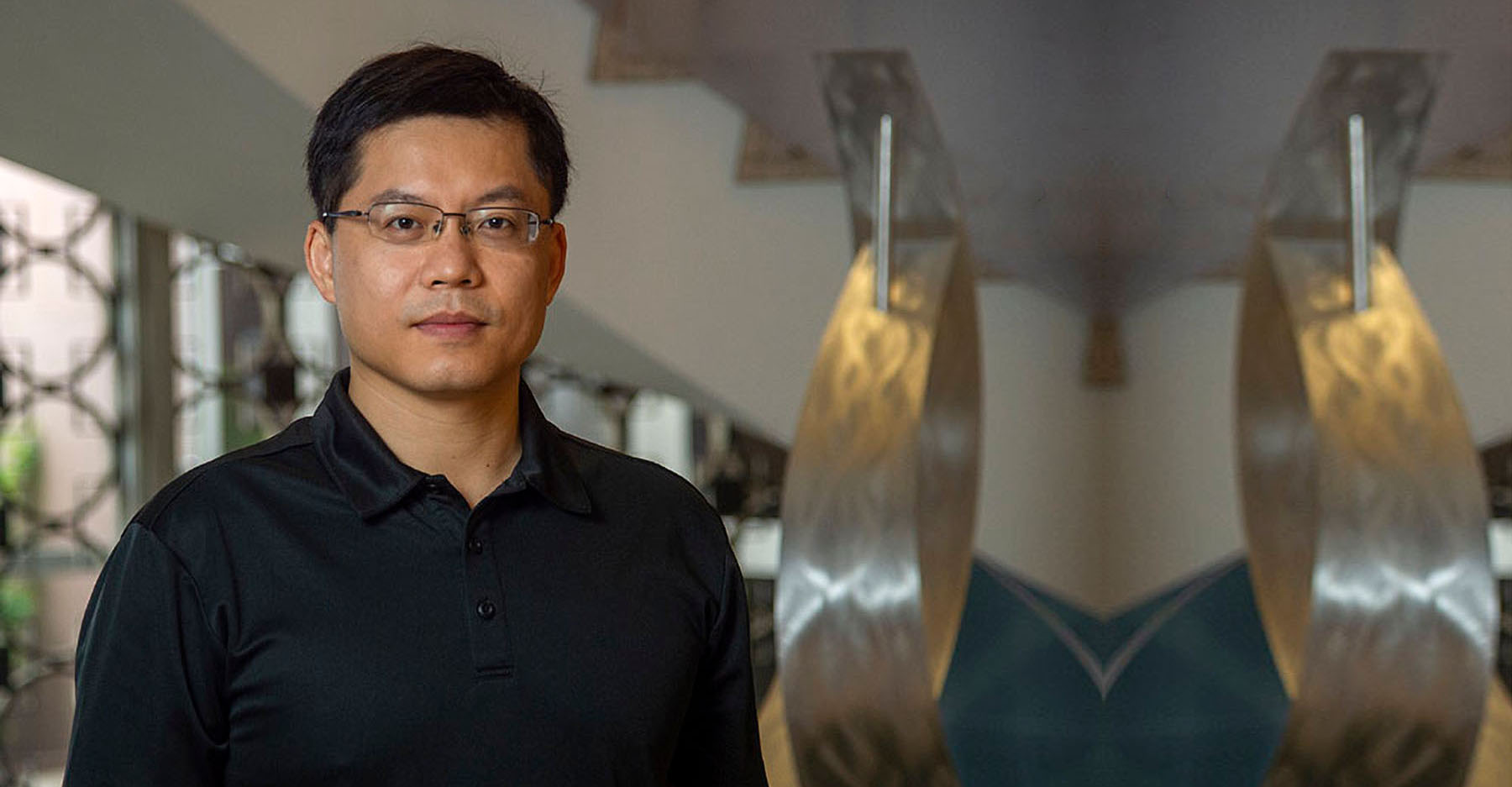
The Daniels School of Business has been recognized by its university for its innovative entrepreneurial efforts.
Our Zhan Pang has been named Purdue University’s third Innovation and Entrepreneurship Fellow, and the first from the Daniels School of Business. Fellows connect research and commercialization, facilitating a knowledge exchange across disciplines and between faculty and students in different colleges across campus.
Pang is the Lewis B. Cullman Rising Star Associate Professor of Management at the Daniels School with rich industry experience as an entrepreneur and management consultant. As a Fellow he will be a bridge-builder between faculty and student research and the commercialization of their discoveries.
“We hold a unique position at the intersection of business and technology, and we say that big ideas don’t change the world until they go to market,” says David Hummels, the Dr. Samuel R. Allen Dean of the Daniels School of Business. “Professor Pang is not only an outstanding scholar –- he has co-founded or been involved in a number of tech startups, and has served in an advisory capacity connecting companies to venture capitalists.”
The Innovation and Entrepreneurship Fellow program is in line with “Purdue’s vision of building an interdisciplinary environment for discovery, learning and engagement to become or remain the most innovative university in America and the world,” Pang says.
The program is coordinated through Purdue’s Burton D. Morgan Center for Entrepreneurship.
As the Daniels School continues to improve and make its curriculum more dynamic, Hummels foresees innovations informed by further collaborations with other units at Purdue; new approaches to teaching, especially ones that make use of new digital tools; and the idea of fragmentation.
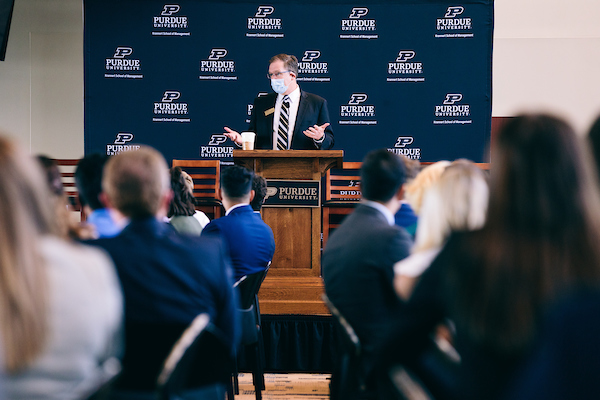
Fragmenting content means courses can take place at different times and places and in different modes.
“We can find ways to desegregate what is traditionally thought of as a four-or-five-month-long semester into shorter experiences where we can go deeper and bring to bear the relevant expertise for a given problem.”
Hummels is excited about implementing “sprint courses” that would take place over a weekend.
“So, rather than think about every 45-contact hour course taking place over 15 or 16 weeks, why not start it at Friday at 8 o’clock in the morning with deliverables that are due at 8 a.m. on Monday?” he asks. “Just as if our students came in to work on a Friday and their boss said ‘I've got to have something for the board meeting on Monday. This is what you've got to do.’
“We’re going to engage them with really intensive efforts over short periods of time that mimic what happens in the business world, but also enables us to be extremely immersive in our approach to certain problems.”
Let us tell you about the innovative ways we are evolving the experience at Purdue's business school.